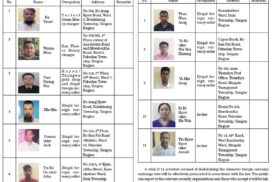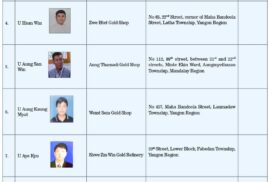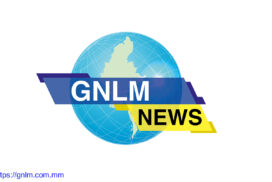Currency market volatility resulted in price swings in gold and fuel oil in 2022.
The World Bank did not issue a Gross Domestic Product growth forecast for Myanmar. Other than Myanmar, the GDP growth forecasts stand at 2.9 per cent for Thailand, 3.8 per cent for Laos, 4.5 per cent for Cambodia, 2.4 per cent for Timor-Leste, 5.9 per cent for Viet Nam, 5.1 per cent for Indonesia, 5.5 per cent for Malaysia and 5.7 per cent for the Philippines. Myanmar is the only country among the ASEAN that the World Bank did not issue a GDP forecast.
Myanmar was hit the hardest by the pandemic-stricken economy and the political changes. The interrelations among three essential key players in the economy (the USD, gold and fuel oil prices) diversified the country’s economy. Stability of those markets matters to the economy.
As a result of this, under the guidance of the Central Committee on Ensuring Smooth Flow of Trade and Goods, the Monitoring and Steering Committee on Gold and Currency Market was formed on 17 December 2021 as gold and currency market stability plays a crucial role in the trade facilitation.
The objectives of the committee are inspecting and prosecuting market manipulation, checking if there is compliance with payment rules or not in the domestic market, and proceeding against those unscrupulous traders who intend to interfere with the free and fair operation of the market under the existing laws, by-laws and regulations in line with the official directives, illegal foreign currency holding, illegal trade and taking legal actions against price manipulators.
Furthermore, the officials concerned will crack down on those people involved in charging a percentage for money withdrawals at the banks as shadow money.
People can file complaints with the committee regarding threats to financial stability, as per this notification.
In 2022, Myanmar’s currency, gold and oil prices fluctuated wildly. The remarkable factors of the changes are revealed as follows.
Foreign exchange market
The Central Bank of Myanmar frequently issued directives and notifications this year with the impacts of the uncertainty of the foreign exchange market.
According to the provisions stipulated in Sections 11, 12 and 13 of the Foreign Exchange Management Law, all the foreign currency earned by locals has to be exchanged for local currency at the Central Bank of Myanmar’s reference rate by opening the accounts at the authorized dealers (ADs) in the country within one working day, according to the notification released on 3 April 2022.
The reference exchange rate for the US dollar was set at K1,850. The aforementioned notification is effective for all foreign currency accounts opened at the ADs before 3 April 2022.
From 4 April, outward remittance is to be undertaken through the ADs under the approval Foreign Exchange Supervisory Committee (FESC) and further directives are to be issued.
The statement mentioned changes in the CBM’s reference rate will be further noticed. Those who fail to comply with those directives will face legal action under the Foreign Exchange Management Law.
The impacts of those notifications negatively affected the exporters depending on the export value transactions.
Afterwards, the directive released on 30 June said that transactions for the exports of agricultural products including corn, rice, bean and oil crops are to be made in dollars instead of Yuan-Kyat/Baht-Kyat.
Therefore, export earnings have to be exchanged for US dollars according to the reference rate of the Central Bank of Myanmar (K1,850). Nonetheless, there is a large gap between the regulated rate and the unauthorized rate of the US dollar. Consequently, it weighed on agricultural exports and exports drastically fell compared to the previous years.
Of agricultural products exported to China through cross-border posts, rice and broken rice exports are given green light to proceed with Yuan as before. According to the US dollar policy, 65 per cent of earnings must be exchanged for local currency at the CBM’s reference foreign exchange rate, while exporters can use 35 per cent of export earnings or transfer or sell them to Authorized Dealers or others with an over-the-counter rate within one month. Rice export was excluded from that restriction.
The US dollar was valued at only K1,900 in early 2022. Then, Kyat depreciation hovered and weakened at K3,000 in the grey market. Therefore, the relevant authorities also interrogated some gold traders and currency exchange operators in end-July.
Thereafter, the CBM made the four-month fixed rate of K1,850 hike to K2,100 on 5 August.
To strengthen the domestic currency in the local forex market, the CBM set CBM set the currency trading band at 0.3 per cent for the Kyat to fluctuate between these two specified upper and lower exchange rates for transactions, selling or buying, according to a directive issued by the CBM on 10 August 2022.
Therefore, financial institutions including banks and informal money exchanges set a dollar value of K2,100 for buying and K2,106 for selling.
Nonetheless, those rates are not effective in trading for now.
Despite the CBM’s notifications, a dollar value hit an all-time high of over K4,500 in the grey market at the end of July. The prices of pharmaceuticals, commodities, consumer goods, raw materials and other imported goods inflated, triggering a shortage of medicines and some important items.
The CBM practised foreign exchange intervention to steer its own currency value and sold the US dollar from the state’s reserve funds at an auction rate for the edible oil, fuel oil and medical sectors. Thanks to the CBM’s intervention, the Kyat-US dollar exchange rate declined to K2,850 at the end of the year.
Gold market
Domestic gold prices moved up and down this year along with instability in the currency market.
Gold export came to a halt owing to the restriction of international flights amid the pandemic. The price of gold was only K1,820,000 per tical (0.578 ounce or 0.016 kilogramme) in early 2022.
The gold price had a bumpy ride because of the chaos in the foreign exchange market.
In a bid to end the black market and stabilize the volatile prices, Yangon Gold Entrepreneurs Association urged the members and gold traders to seek a business licence for gold shops and licence for gold bar transactions and it will take action against those unauthorized dealers involved in online trade platforms under the existing laws, according to its statement released on 17 May.
Additionally, the CBM released a statement on 3 April 2022 that gold transactions were to be made depending on the reference exchange rate (K1,850) to control the price rally.
YGEA called for an urgent meeting on 8 April. The meeting determined to carry out gold transactions depending on the CBM’s reference exchange rate. However, it has not come into force yet.
The local gold price correlates with the global gold spot price and foreign exchange market.
The soaring dollar exchanging at over K4,500 pushed up the pure gold price to a record-high of K3.7 million per tical in late August.
The Ministry of Natural Resources and Environmental Conservation declared the sales of gold coins weighing one tical, 0.5 tical and 0.25 tical through state-run media on 2 September. The gold coins have been on sale at Nay Pyi Taw’s Gems Emporium from 5 September, except on public holidays.
The sales have expanded to new locations in the Yangon and Mandalay regions in addition to Nay Pyi Taw.
The governor of the Central Bank of Myanmar (CBM) and officials of the Monitoring and Steering Committee on the Gold and Currency Market discussed matters regarding the stability of the gold and currency market in the afternoon of 14 September in Nay Pyi Taw.
At the meeting, the governor of the CBM remarked on the further coordination of the departments concerned, gold bar transactions to be made with the banking system and operations of the banks, further support of the ministries concerned and the CBM to achieve price stability, and further cooperation between gold businesspersons and the officials.
Then, on 30 September, the seven private banks opened special counters at the designated 48 branches to offer banking services for gold transactions.
The seven private banks are providing banking services by opening special counters at their 48 branches in Yangon and Mandalay regions and Mon State (Mawlamyine) to facilitate gold transactions with the banking payment system.
Those banks are Kanbawza Bank (KBZ Bank), Co-operative Bank (CB Bank) PCL, Ayeyawady (AYA) Bank, Myanmar Apex Bank (MAB), UAB Bank, Yoma Bank and Ayeyawady Farmers Development Bank (A Bank).
With an aim at reducing gold prices, the YGEA and Mandalay Region Gold Entrepreneurs Association sold gold bullion supplied by the executive members. the members, gold refinery shops and traders as well.
The Ministry of Natural Resources and Environmental Conservation sold three visses of gold ingots each in Yangon and Mandalay under the auction system on 6 October.
This move resulted in the gold price decrease of K2,697,000 per tical at the end of the year.
Despite the YGEA’s reference price of K2,140,000 per tical, the market price still rocketed to K2,697,000 per tical. There is a price difference of over K500,000 per tical between the reference price and the market price.
YGEA calculated the price depending on the Central Bank of Myanmar’s reference exchange rate of K2,100, with some addition. The dollar was exchanged at K2,850 in the black market in the end-2022. Meanwhile, YGEA called for the gold shops in Yangon Region to sell pure gold at K2,530,000 per tical, according to its notification released on 30 October 2022.
Fuel oil market
In 2022, the fuel oil market went up and down along with the currency market.
Ninety per cent of fuel oil in Myanmar is imported, while the remaining 10 per cent is produced locally. The domestic fuel price is highly correlated with international prices. The State is steering the market to mitigate the loss between the importers, sellers and energy consumers. Consequently, the government is trying to distribute the oil at a reasonable price compared to those of regional countries.
Some countries levied higher tax rates and hiked oil prices than Myanmar. However, Malaysia’s oil sector receives government subsidies and the prices are about 60 per cent cheaper than that of Myanmar. Every country lays down different patterns of policy to fix the oil prices. Myanmar also poses only a lower tax rate on fuel oil and strives for energy consumers to buy the oil at a cheaper rate.
Myanmar annually imports 6 million tonnes of fuel oil from foreign countries. As a result of this, the global crude oil prices and currency market conditions highly affected the fuel oil market.
In early 2022, the prices touched a low of K1,390 per litre for Octane 92, K1,440 for Octane 95, K1,375 for diesel and K1,385 for premium diesel.
Tracking the Kyat devaluation against the US dollar in the forex market, a fuel oil price rally happened.
The Ministry of Commerce in coordination with the Myanmar Petroleum Trade Association carried out a scheme to distribute fuel oil at fairer rates through the government-sponsored petrol station chains. And, the energy consumers could buy them in early 2022. The total volume of fuel oil that is sold at very cheap rates is equivalent to the amount that the oil importers directly purchased the foreign currency from the CBM.
The Supervisory Committee on Oil Import, Storage and Distribution of Fuel Oil is issuing the daily reference rate for oil to offer a reasonable price to energy consumers. The reference rate is calculated as per the price index set by the Mean of Platts Singapore (MOPS), shipping cost, profit margin, premium insurance, tax and other general costs.
The rates for regions and states other than Yangon are evaluated after adding the transportation cost and the retail reference rates daily cover on the state-run newspapers and are posted on the media and official website and Facebook page of the department on a daily basis starting from 4 May.
The committee is inspecting the fuel stations whether they are overcharging or not. The authorities are taking action against those retailers of fuel stations under the Petroleum and Petroleum Products Law 2017 if they are found overcharging rather than the set reference rate. The committee is steering the oil sector effectively not to have a shortage of oil in the domestic market and ensure price stability for energy consumers. In early August, some fuel stations in regions and states ran out of oil following the surging US dollar.
Some petrol stations were allegedly suspending fuel sales and setting limited sales on the possible shortage of fuel oil, sparking consumers’ concerns and raising fuel prices. They seemed to take advantage of the consumers’ concerns for their benefits, according to the statement released by the Central Committee on Ensuring Smooth Flow of Trade and Goods on 16 August. The committee has assured adequate fuel supply until end-August. It is also working together with Myanmar Petroleum Trade Association to ensure a steady fuel supply for energy consumers to mitigate concerns, the statement mentioned.
The consumers can complain about the halt in fuel sales and limited sales through the contact numbers of the respective regions and states if they find those stations that violate the rules, the committee stated. Nonetheless, fuel prices continued to gain at K2,605 per litre of Octane 92, K2,670 for Octane 95, K3,245 for diesel and K3,330 for premium diesel at the end of August.
The CBM also announced on 31 August that it will provide more than US$200 million through the foreign exchange market according to the decision made by Foreign Exchange Supervisory Committee to ease the commodity inflation triggered by fuel price spike. Later, the fuel prices slightly declined. The year-end market data showed that the fuel prices stood at K2,010 per litre for Octane 92, K2,080 for Octane 95, K2,365 for diesel and K2,445 for premium diesel. – NN/EMM













